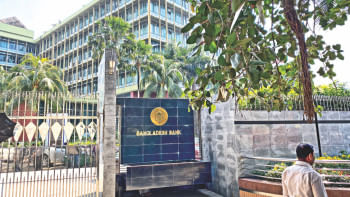News Analysis: Slow response brings us here

In the first week of last month when the country started seeing a resurgence of Covid-19 infections, healthcare experts sounded alarm, urging the government to take immediate measures to rein in the surge before it goes out of control.
The government's response to a looming crisis, however, was lackadaisical.
The authorities blamed people's reluctance to follow the health safety guidelines for the spike and relied largely on procedural work such as sending letters to district administration for enforcing the guidelines and limiting mass gathering.
Even in the fourth week of last month when Covid cases as well as deaths from the virus kept soaring, the health directorate officials ruled out any possibility of re-imposition of a shutdown. It did not spell out any measures to deal with the situation that had the signs of an impending crisis.
Then on March 30, the government issued an 18-point directive to curb the rapid surge in cases. By that time, the country was already on course to see the highest infection rate ever. But nowhere in the 18-point directive the government hinted about any restriction or lockdown.
Two days later, the countrymen saw a careless act on the part of the health directorate as it allowed the holding of the entrance test for medical colleges without considering the health hazards it could pose.
Over 1.16 lakh candidates and their guardians thronged 55 centres across the country amid a shortage of transport. The centres saw huge crowds of examinees and guardians outside -- oblivious to the necessity of maintaining social distancing. The examinees had to make their way through crowds to enter the exam halls.
The following day, quite unexpectedly came the announcement of a weeklong lockdown.
The decision to impose restrictions on transport, public movement and businesses caught the people off guard, sending them into a frenzy to stock up on food supplies and household essentials.
Hundreds others belonging to the lower strata of society hit the bus and launch terminals and went back to their village homes with their families. Social distancing norms were discarded as they squeezed into buses and launches. The mass exodus raised the concern of spreading the deadly virus to remote villages.
Shop owners and employees of different markets were also taken aback by the sudden decision. They hit the streets, protesting the government restrictions. They staged demonstrations for the second consecutive day yesterday.
All these expose not only the government's weaknesses in decision-making but also a lack of coordination and seriousness required to respond to such a health emergency.
These also beg a question: did the government have any plan to tackle a resurgence of Covid-19 infections? If so, then why there was no cohesion in all these decisions? Why do all these steps seem an outcome of muddled thinking even after dealing with the pandemic for more than a year?
Because of such muddled thinking, we saw people, having little time to prepare for a lockdown, rush to groceries and shopping malls in hordes.
We even saw some contradictions in the government circular which said public and private offices would remain open, albeit on a limited scale. But at the same time, the government imposed restrictions on all types of public transport.
So, how do people go to their workplaces?
Similarly, the kitchen markets have been ordered to stay open from 8:00am to 4:00pm every day. But how will people go to markets since public transports remain off the road?
Yesterday, we saw many wait in anguish for transport to go to their workplaces.
Then comes another contradiction. The government kept Ekushey Boi Mela open to public from noon to 5:00pm every day while it discouraged all types of fair and banned all political, social and religious gatherings.
The government's order seemed to be aimed mainly at the people of cities, especially the capital. There is no clear guidelines for the vast number of people living in rural areas.
The bigger question is: how will a large number of people who live on a daily income survive during the period of restrictions? Will the government provide them with food? A restriction or lockdown alone cannot effectively ensure a successful enforcement of the health safety regulations unless it is aided by comprehensive relief and cash incentive programmes for the poor.
In this crucial time, the government cannot repeat the mistakes it made during the first wave of Covid-19. We hope that the government will show prudence and farsightedness in making decisions so that its actions do not lead to new problems and miseries in public life.


 For all latest news, follow The Daily Star's Google News channel.
For all latest news, follow The Daily Star's Google News channel. 



Comments